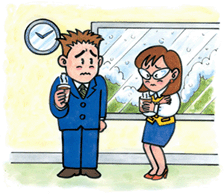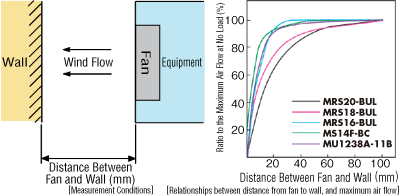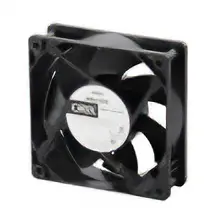What is the Most Effective Way to Install a Fan?


-

Ugh, it's cold. It's snowing outside! I don't like the cold...
-

I'm not used to a cold weather either... But even though it's so cold, I just received an inquiry from a customer who said, "I'm having trouble with high temperatures inside the control cabinet even though it has a cooling fan."

-

There are lots of drivers and other devices inside the control cabinet, right? If appropriate heat countermeasures are not taken, the temperature inside the control cabinet may rise even in winter. So, what did you suggest?
-

Yes. I thought it was possible that the air flow of the fan might not be sufficient to deal with the heat generation inside the control cabinet, so I suggested to check the operating conditions again and confirm whether their current fan is appropriate.
-

I'm impressed. But even if you use a fan with a large air flow like the MRS Series, if you don't install it in the right way, you may not be able to take advantage of its characteristics.
For example, the cooling method that exhausts the warm air from the inside to the outside, as in this control cabinet, is called "ventilation and cooling," but do you know what point you must pay close attention to in that case? -

...No, I don't.
-

You need to learn about fans as well as motors. Mr. Vex.
First of all, since it's called "ventilation," the control cabinet needs to have an inlet and an outlet for the air. An air intake vent and an exhaust vent. This is same ventilation as when you change the air in a room. The key here is the size of the air intake vent and exhaust vent. It's better to make it big as possible so that more air can move through it, which is more effective for ventilation. This is the effect of pressure loss. -

Pressure loss?
-

Simply put, pressure loss refers to the "flow resistance" of air. The narrower the air passage (the "flow channel"), the larger it will be.
-

I see. So that's why they make air intake vents and exhaust vents so big!
-

That's right! You're beginning to get it.
However, even if you increase the size of the air intake vent and exhaust vent, you may not get the desired effect depending on how the control cabinet is installed. For example, the distance between the wall and the control cabinet has an effect on this. Can you guess what it is? -

Ah! The wall is an obstacle that reduces the air flow! This means the wall becomes a loss and the air flow decreases. So then how much distance should it be?
-

100 mm or more would be ideal. If that's not possible, I would recommend making the distance equal to the fan's thickness at least. Try referring to this data.
-

I see. The data makes it clear too.

-

Vex, there's more you need to know in order to recommend more effective installation!
-

Securing space for the air intake vent and exhaust vent, the installation distance between the wall and the control cabinet... Other than that... Ms. Ori, I'm not sure...
-

Air moves upwards as it warms up! So, if we set up vents on the bottom and top of the control cabinet, and use the bottom as the air intake vent and the top as the exhaust vent...
-

Ah! Cold air is sucked in from below, and warm air is exhausted from above! Hmm. There's a lot to know about heat measures.
Ms. Ori, I will try to make a proposal to the customer with reference what you have just taught me. -

OK. Also, try to introduce the technical seminar on fans and our motor sizing service.
What I described to you just now is only a small part, and I think it might be quite difficult for people to understand how to use fans over the phone or by e-mail. The technical seminar will cover the following content, and I believe they will be able to gain a broad understanding, from basics to applications.- Fan types and features
- Basic terminology
- How to use them effectively
- Heat and environmental measures for control cabinets
- Selection Procedure
- Effective air cooling methods for high-density packaging equipment etc.
-

The customer can request the motor sizing service not just via phone or fax, but also through the Oriental Motor website, right?
-

That's right. Please introduce them as well.
-

Understood.
